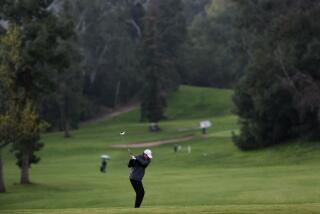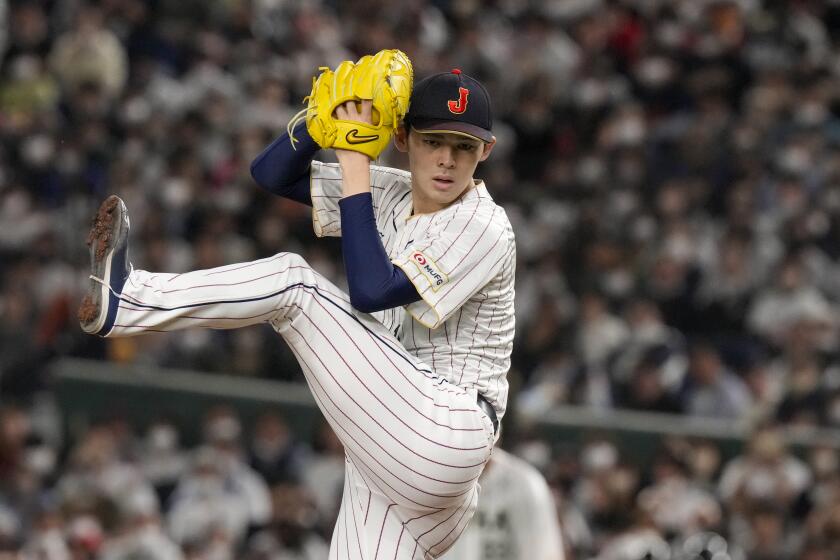Tee Time in Russia : So Far, Muscovites Like What Little They Know About the Game of Golf
- Share via
MOSCOW — After puzzling through a digest of basic golf rules on the eve of the first Russian Golf Championship, sports reporter Yelena Roerich had to clear one thing up.
“So the lowest score wins?” she asked, slightly incredulous.
As the two-day tournament got under way Thursday at Russia’s only golf course, a cramped nine-hole layout, it was clear that some officials--not to mention a few of the participants--were equally clueless.
“Hey, Sasha, does a fence count as a man-made object?” one judge radioed to the tournament director, who had equipped each of his officials with walkie-talkies in anticipation of just such an emergency.
“I need to know if I can move this kid’s ball out a club’s length from the fence without adding a penalty stroke,” the official explained.
Despite the confusion, the fathers of Russian golf were bursting with pride as 40 competitors--the oldest barely 30--drove, putted, swung, missed and cheerfully searched for lost balls while crisscrossing the par-34 course on a sunny fall day.
“Without golf, we can’t cooperate with other countries,” said Alexander Kisilov, the club pro, who learned his game in Iraq and Ethiopia.
“All over the world, people play golf--25 million of them in America alone,” he added earnestly. “And none of them will ever understand us if we don’t play, too. It’s high time we joined the club of golfing nations.”
But full-fledged membership in the world golfing community probably will elude Russia for a while yet.
“People have heard of the word golf and they know it’s a sport, but that’s about it,” said Vadim Filippov, a 27-year-old eye surgeon. “When I get on a bus with my clubs, people think I’m going off to play croquet.”
Even such basic terms as fairvai, green and tee seemed to mystify the Russian journalists covering the competition.
At a pre-tournament news conference, Aleksei Nikolov, general secretary of the Russian Golf Assn., pulled out an assortment of wooden and metal clubs and tried to explain how different weights and angles came into play.
Finally, he looked up and assessed the bewildered faces in front of him. “So, you see,” he concluded in the simplest terms possible, “all these sneaky little things play a big role in golf.”
To give reporters a feel for the game, Nikolov let them try out the driving range. He won at least a few converts. “It’s a wonderful sport, because every time you prepare to swing, you’re taking a big gamble,” reporter Roerich, a former professional handball player, said enthusiastically. “Plus, you’re out in the fresh air, and there’s no risk of getting injured.”
Once fiercely proud of their own sports culture, Russians now seem eager to import as many foreign games as possible.
The Red Devils, a baseball team created in the mid-1980s from a group of track and field athletes, has toured California and Alaska. American-style football started in 1990, and the Russian Czars recently gained admission into the European Football League, beating out their archrivals, the Moscow Bears.
Some think golf, once deemed too bourgeois for the land of the proletariat, will be the next big hit here. Robert Trent Jones Jr., a Palo Alto golf course architect, hopes to build an 18-hole course in a forest outside Moscow, although his plans have been stalled for years.
Given the absence of municipal courses, however, and considering that Russia manufactures no clubs, balls or tees, golf may be too expensive to catch on here.
Built on top of a former garbage dump in southwest Moscow, surrounded by squat apartment buildings and sprawling foreign embassies, Russia’s lone golf club charges foreigners $20,000 for membership, plus $2,000 per year to play. Russians pay 400,000 rubles, or $1,600--four to five times the average yearly salary here.
About 300 children from a nearby sports school get free lessons. The best are competing in the tournament, playing the course four times in two days in pursuit of a 50,000-ruble--about $200--first prize.
Setting off to look for the fluorescent orange ball he had somehow putted into the water on the second hole, Aleksei Popov, 18, echoed many of his fellow competitors’ ambitions.
“Of course I want to be a professional golfer,” he said, marking a penalty stroke on his scorecard as he flipped the ball back onto the fairway.
Eye surgeon Filippov, one of the few non-students participating, said he enjoys golf because “it requires a lot of technical skill--it’s not just kicking a ball around.”
Blue eyes sparkling in his sunburned face, he added: “Plus, I know that there are world championships with million-dollar prizes. That says something about the sport.”








